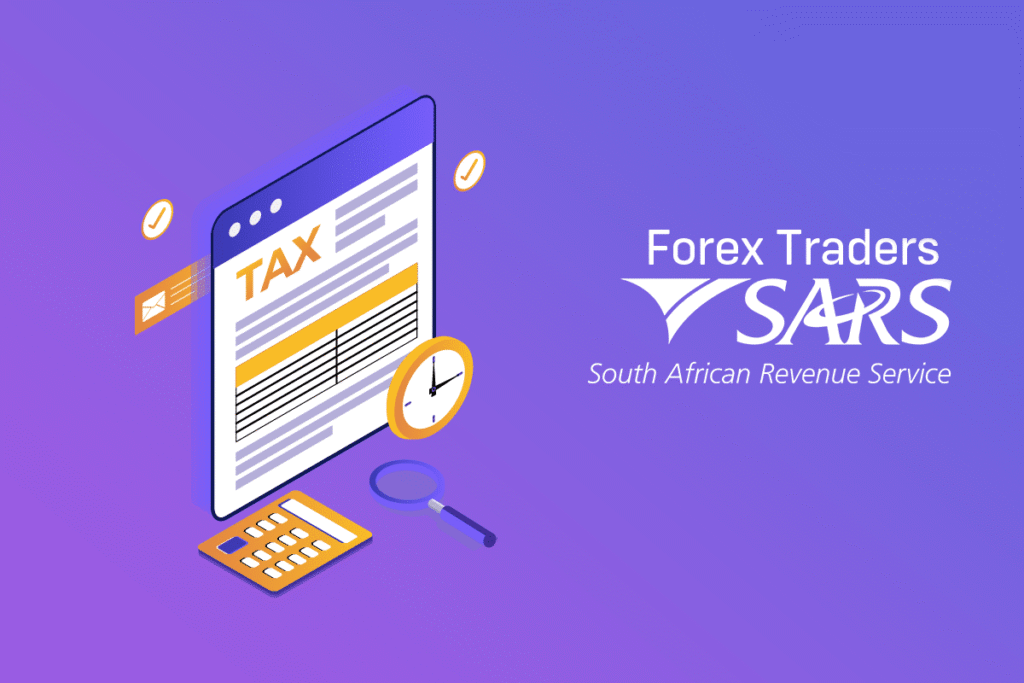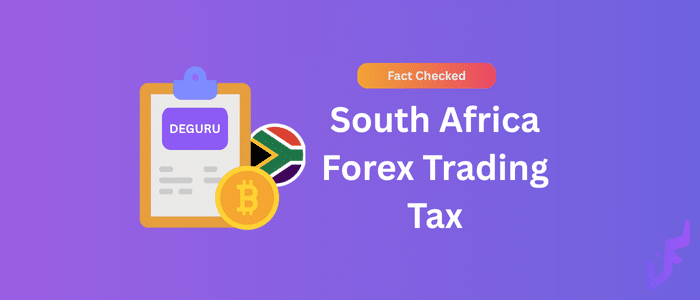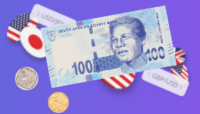The number of forex traders in South Africa has been doubling almost every year, which is due to low employment rates and the rise of forex FURUS promoting forex trading as a ticket to break out of poverty and 9-to-5. But what they never talk about is Tax, how forex traders pay tax in South Africa.
The reason they don’t talk about being taxed as traders is that they are not real traders; they are just promoters hired by brokers and being paid a salary by these brokers. Well, that’s a topic for another day.

In this article, I will talk about do forex traders pay tax in South Africa or how forex traders are being taxed. But not every trader will be taxed, and we are not taxed the same amount.
How Forex Trading Profits Are Taxed
Forex traders can ether be taxed based on whether SARS sees you as a trader or an investor. The distinction is important because it affects the type of tax you pay and the deductions you can claim.
What is a Trader?
If you trade frequently and generate income consistently from your forex activities, practically a day trader. SARS considers you a trader. In this case:
- All profits are taxed under Income Tax.
- You are required to register as a provisional taxpayer.
- You can claim a wide range of deductions related to trading, such as internet costs, software, and home office expenses.
Taxable Income (R) | Rates of Tax |
|---|---|
0 – 237,100 | 18% of taxable income |
237,101 – 370,500 | R42,678 + 26% of taxable income above R237,100 |
370,501 – 512,800 | R77,362 + 31% of taxable income above R370,500 |
512,801 – 673,000 | R121,475 + 36% of taxable income above R512,800 |
673,001 – 857,900 | R179,147 + 39% of taxable income above R673,000 |
857,901 – 1,817,000 | R251,258 + 41% of taxable income above R857,900 |
1,817,001 and above | R644,489 + 45% of taxable income above R1,817,000 |
What is an Investor?
If you trade forex occasionally, perhaps as a swing trader holding for months, SARS may classify you as an investor. This means:
- You may pay Capital Gains Tax (CGT) on profits you make.
- You’re taxed on 40% of the gain, based on your income tax rate.
Example: If you realize a capital gain of R100,000, R40,000 is added to your taxable income. If your marginal tax rate is 30%, you’ll pay R12,000 in tax on the gain.
Do Forex Traders Pay Tax?
Yes, forex traders must pay tax in South Africa. The money you make from forex trading is seen as income by SARS.
There is no special tax examption for forex traders. It’s treated just like any other income. SARS expects you to declare and pay tax on your profits.

But instead of paying all your tax once at the end of the year (which can be a lot), SARS lets you pay in smaller amounts during the year. This is called provisional tax.
How Provisional tax Works
You don’t wait for tax season like most workers or businesses do. As a forex trader, you pay tax twice a year, based on how much money you think you’ll make.
- The first payment is halfway through the year (around August).
- The second payment is at the end of the year (around February).
- Sometimes, if you didn’t pay enough, you can make a third payment later to avoid penalties.
Steps to Pay Tax as a Forex Trader in South Africa
Here’s how to stay on the right side of SARS:
Step 1: Register for a Tax Number
Go to SARS or register online at sarsefiling.co.za if you don’t already have a tax number.
Step 2: Track Your Trades
Keep a record of:
- How much you deposit and withdraw
- Every trade you make
- Your profit or loss
Most brokers give you a statement every month. Save it!, also get a trading journal
Step 3: File a Tax Return Every Year
Between July and October, you must submit a tax return. Log in to eFiling and fill out the form called ITR12. Show SARS how much money you made (or lost) from trading.
If trading you are a day trader, SARS might ask you to pay twice a year under a Provisional Trax
What Can Forex Traders Claim as Expenses?
If trading is like your job or business, you can lower your tax by showing expenses.
Here are things you might deduct:
- Trading software or app subscriptions
- Internet bills
- Laptop or trading computer
- Electricity
- Education or trading courses
Keep receipts! You must prove the expenses are linked to your trading.
Conclusion
Yes, forex traders in South Africa must pay tax on the money they make. Whether you trade part-time or full-time, SARS expects you to report your profits and pay your fair share. If you’re serious about trading, it’s a good idea to keep records, file your taxes on time, and even consider registering a business for better tax benefits.
FAQ
FAQs About Traders Being Taxed
Yes. If you make profit, even from home SARS considers it income, and it must be declared.
SARS can see deposits and withdrawals in your bank account. Some brokers also report large transfers. It’s better to be honest and file your tax return.
You still need to report it. Declaring a loss can help lower your tax if you have other income, and it also builds a track record with SARS.
You don’t pay both separately. Provisional tax is just a way of paying your income tax early, especially if you don’t earn a monthly salary.
Yes, if you’re trading as a business or full-time trader, you can claim expenses related to trading. Just keep proper records and receipts.
If you earn a lot from trading, a registered company (Pty Ltd) can give you tax benefits. You can also claim more business expenses and grow into a full trading brand.










